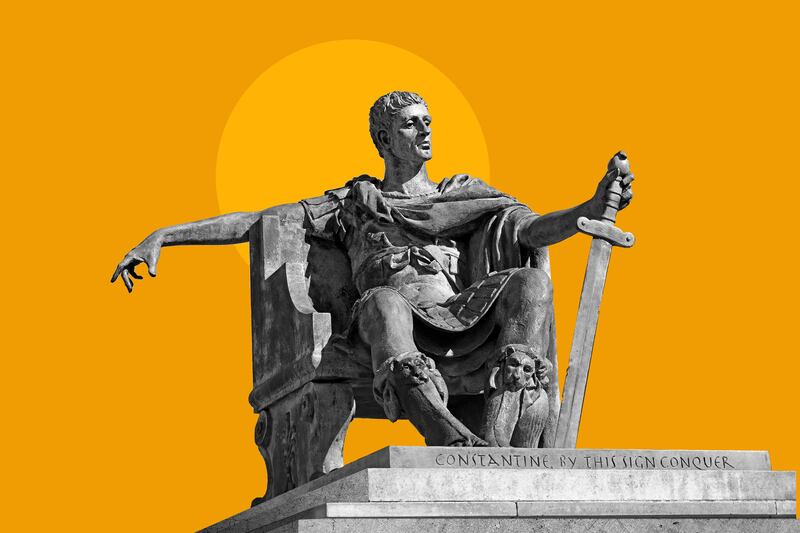Was Donald J. Trump a divinely appointed fighter destined to lead religious conservatives to victory in America’s culture wars? That was the view in some quarters where Trump was compared to the Persian king Cyrus, who protected Jews in exile and returned them to the promised land.
Rather than Cyrus, however, some Catholic and Orthodox traditions look for the second coming of Constantine the Great, the first Christian emperor. The hope has been that this new Constantine would seize and wield power on behalf of a new Christendom.
Russian President Vladimir Putin seems to be positioning himself for that role — and not just for Russians.
To understand the connection between Constantine and Putin, we must first look at Putin’s upbringing. He was raised in the USSR by a Christian mother and atheist father, and presides over a country with a de-facto state religion. Putin has a complex relationship with the Russian Orthodox Church, but it plays an important role in both his messaging at home and appeal abroad. The church’s leader, Patriarch Kirill, recently defended the invasion of Ukraine in a sermon and has since doubled down, calling Russia’s opponents in Ukraine “evil forces.”
While Putin’s brutality has long been noted, some of the religious right have admired his defense of traditional sexual ethics and his hostility toward Islam. For example, in 2014, evangelist Franklin Graham praised Putin for “protecting children from any homosexual agenda or propaganda.” Putin’s intervention in Syria was also met with praise by Mideast Christians, who saw his military action there as an effort to “protect the Christian faith.”
Just last month, 2020 Delaware Republican Senate nominee Lauren Witzke stated, “I identify more with Putin’s Christian values than I do with Joe Biden.”
Rod Dreher, a senior editor at The American Conservative, has written in the past about Putin as a flawed defender of Christian values. Fox’s Tucker Carlson rhetorically asked his audience if Putin is “trying to snuff out Christianity.”
In short, Putin seems to strike some conservatives as a new Constantine for a new Christendom standing against progressive totalitarianism.
Sohrab Ahmari, however, has stood out as the most intellectual of advocates of a Constantinian figure.
A convert to Roman Catholicism, Ahmari gained popularity for his memoir “From Fire by Water” and more recently “The Unbroken Thread.” In 2019, Ahmari’s celebrity skyrocketed when he became embroiled in a dispute with commentator David French, now of the The Dispatch, but then with National Review.
Ahmari took to Twitter to vent about the establishment of a drag-queen children’s reading hour at a library in Sacramento and said, “There’s no polite, David French-ian third way around the cultural civil war.” The pair then debated, arguing over whether to defend civil liberty or pursue a Christian social order.
At The Catholic University of America, when asked by moderator Ross Douthat about his support for then-President Trump, Ahmari stated, “We need a state and a public order that supports the flourishing of religion. ... It was only after the Constantinian conversion that the average Roman cobbler could think to himself as becoming a Christian.”
While popular works such as the Dan Brown novel “The Da Vinci Code” have widely circulated pseudo-historical beliefs concerning the emperor’s role in the formulation of the church, Constantine’s conversion drastically changed the religious landscape of the Roman empire. After efforts like the Diocletian persecutions failed, Christianity’s dominance across the Mediterranean world seemed unstoppable.
Upon becoming emperor, Constantine protected Christians from persecution, exempted their participation in state pagan rituals, required the return of confiscated Christian property, called the First Council of Nicaea, stripped Roman coinage of pagan symbolism and eventually began imposing Christianity on pagan sects. Given that Christians worshiped an executed “criminal,” all of this was a dramatic shift in the relationship between Christians and political power. And despite Julian the Apostate’s effort to turn back the clock to Greco-Roman religiosity, the future of the empire was decidedly Christian.
If Putin has ever entertained hope that that he would similarly transform an increasingly secular world, the invasion of Ukraine has surely dashed it.
The people of Ukraine did not welcome Putin as a Christian emperor but, rightly, as a totalitarian dictator aimed at conquest. The images of Catholic priests saying Mass in shelters and ordinary Ukrainians praying the rosary in the snow discredit any fantasy that Putin defenders might have entertained.
And fantasies they were. Indeed, one has a sense that the pro-Putin posture, as evidenced by Witzke, was performative, meant to shock “liberal” interlocutors and expose either their religious commitments to liberalism or weak Christian convictions. Not expected was that Putin would act, that he would be more than a would-be Constantine.
To be clear, both Carlson and Ahmari have denounced Putin’s military action in Ukraine.
All of this, of course, was anticipated in nothing less than the Bible, specifically Psalm 146:3, where the psalmist says: “Put not your trust in princes.”
It’s good advice, no matter what epoch or empire in which one lives.
Correction: A previous version of this column erroneously implied that Sohrab Ahmari was “pro-Putin.” The column has been amended to rectify the mischaracterization.
Daniel N. Gullotta is a Ph.D. candidate in American religious history at Stanford University. He is also the host of the “The Age of Jackson Podcast.” James Patterson is an associate professor of politics at Ave Maria University. His latest book is “Religion in the Public Square: Sheen, King, Falwell.”

